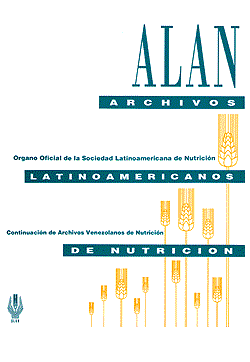Ultra-processed food consumption and nutritional status in Uruguayan and Brazilian children between three to five years
DOI:
https://doi.org/10.37527/2023.73.S2.006Palabras clave:
Child, Childhood Obesity, Eating Behavior, Ultra-Processed Foods, Body Mass Index, Niño, Obesidad Infantil, Conducta Alimentaria, Alimentos Procesados, Índice de Masa CorporalResumen
Introduction. There is growing consensus globally that the consumption of ultra- processed food (UPF) can negatively affect the nutritional status of children. Objective. The present study aims to evaluate associations between the consumption of UPF and the nutritional status in a sample of Uruguayan and Brazilian preschoolers belonging to two studies: the ENDIS Study and the Pelotas 2015 Birth Cohort. Materials and methods. We conducted a cross-sectional analysis. The main outcome measure was obesity defined as BMI for age and sex ≥ +3 z-scores. The score of UPF consumption was the main exposure measured. Each positive answer of habitual intake was added up to create a UPF score ranging from zero to six or more UPF. Crude and adjusted logistic regressions were performed for the associations between UPF consumption and nutritional status in preschoolers. Results. The final sample consisted of 8,687 preschool children, 50.8% belonging to the Uruguayan study, while the remaining 49.2% belonged to the Brazilian study. Nearly 5% of the sample of young children were obese. We didn’t observe a relationship between the score of UPF consumption and obesity, the odds ratio (OR) was 1.04 (95% CI, 1.00–1.09). Adjustments resulted in modest attenuation of the relationship and a lack of statistical significance. However, in children under 48 months, the score of UPF consumption was directly associated with childhood obesity. Conclusions. Results suggest that higher consumption of UPF is associated with obesity in Uruguayan and Brazilian preschool children under 4 years of age. These findings suggest that actions to reduce ultra- processed food consumption could lead to diminish obesity patterns and bring important public health benefits.
Introducción. Existe creciente consenso a nivel mundial de que el consumo de alimentos ultraprocesados puede afectar negativamente el estado nutricional de los niños. Objetivo. El presente estudio tiene como objetivo evaluar asociaciones entre el consumo de ultraprocesados y el estado nutricional en una muestra de preescolares uruguayos y brasileños pertenecientes a dos estudios: el Estudio ENDIS y la Cohorte de Nacimiento de Pelotas 2015. Materiales y métodos. Se realizó un análisis transversal. La principal medida de resultado fue la obesidad definida como el IMC/edad y sexo ≥ +3 puntuaciones z. La puntuación del consumo de ultraprocesados fue la principal exposición. Cada respuesta positiva de la ingesta habitual se sumó para crear una puntuación de ultraprocesados que oscilaba entre cero y seis o más. Se realizaron regresiones logísticas crudas y ajustadas. Resultados. La muestra final estuvo constituida por 8.687 niños, de los cuales el 50,8% pertenecía al estudio uruguayo, mientras que el 49,2% restante pertenecía al estudio brasileño. Casi el 5% de la muestra de niños pequeños eran obesos. No observamos relación entre la puntuación del consumo de ultraprocesados y la obesidad, el odds ratio (OR) fue de 1,04 (IC 95%, 1,00-1,09). Los ajustes dieron lugar a modesta atenuación de la relación y falta de significación estadística. Sin embargo, en menores de 48 meses la puntuación de consumo de ultraprocesados se asoció directamente con la obesidad infantil. Conclusiones. Los resultados sugieren que un mayor consumo de ultraprocesados se asocia con obesidad en prescolares uruguayos y brasileños menores de 4 años. Estos hallazgos sugieren que las acciones para reducir el consumo de alimentos ultraprocesados podrían conducir a una disminución de los patrones de obesidad y traer importantes beneficios para la salud pública.
Descargas
Descargas
Publicado
Cómo citar
Número
Sección
Licencia
Derechos de autor 2024 Isabel Pereyra-González, Romina Buffarini, Andrea Gomez, Simone Farías-Antúnez, Andrea Mary Fletcher, Lucía Gómez Garbero, Augusto Ferreira Umpiérrez, Marlos Rodrigues Domingues, Mariângela Freitas da Silveira

Esta obra está bajo una licencia internacional Creative Commons Atribución-NoComercial 4.0.
Usted es libre de:
Compartir — copiar y redistribuir el material en cualquier medio o formato
Adaptar — remezclar, transformar y construir a partir del material
La licenciante no puede revocar estas libertades en tanto usted siga los términos de la licencia
Bajo los siguientes términos:
Atribución — Usted debe dar crédito de manera adecuada, brindar un enlace a la licencia, e indicar si se han realizado cambios. Puede hacerlo en cualquier forma razonable, pero no de forma tal que sugiera que usted o su uso tienen el apoyo de la licenciante.
NoComercial — Usted no puede hacer uso del material con propósitos comerciales.
No hay restricciones adicionales — No puede aplicar términos legales ni medidas tecnológicas que restrinjan legalmente a otras a hacer cualquier uso permitido por la licencia.




